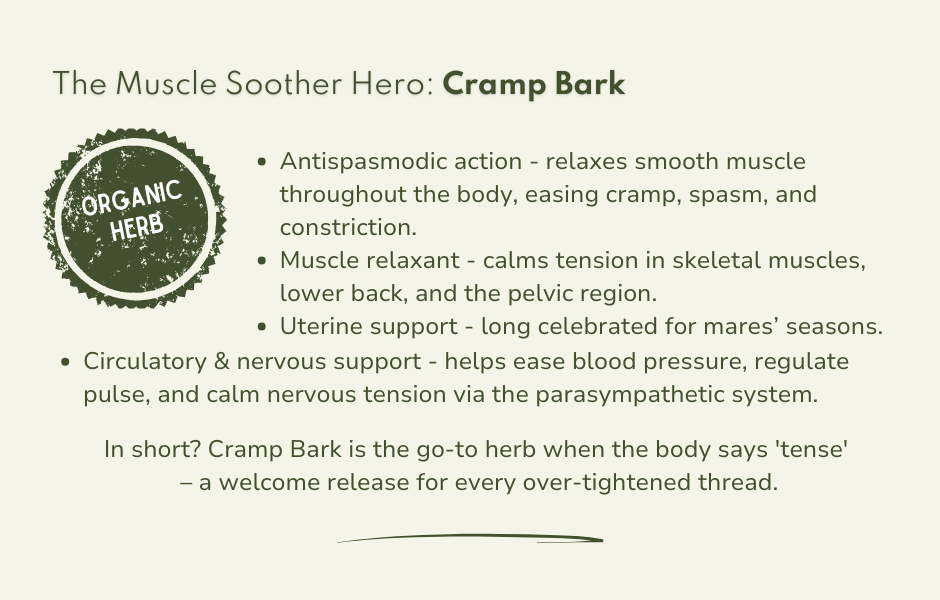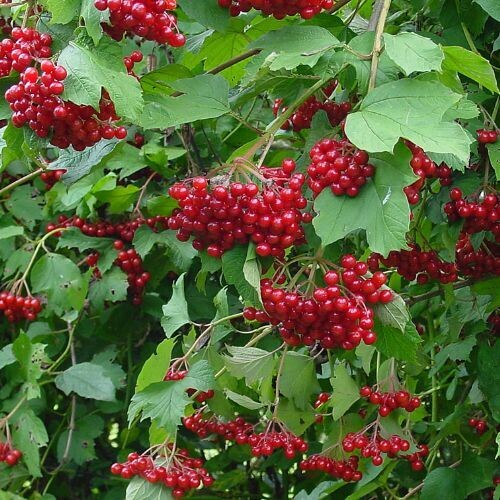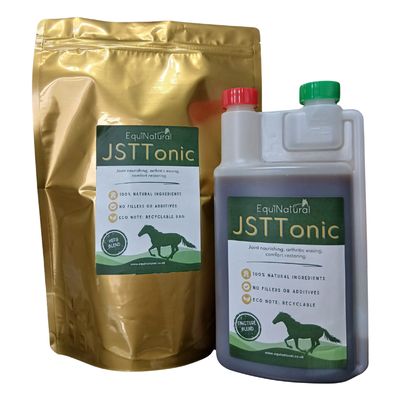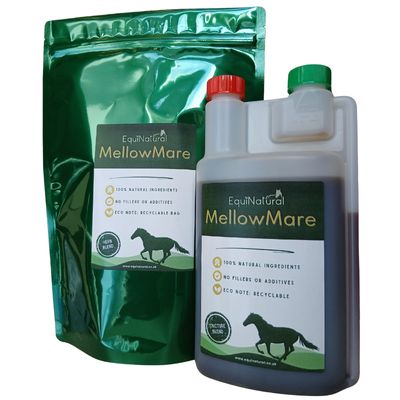CRAMP BARK (Viburnum opulus) *Organic herb for horses - spasm-soothing, muscle-relaxing, tension-easing
Benefits of Cramp Bark for Horses
The clue’s in the name - Cramp Bark is one of the most reliable herb supporters for soothing spasms, softening tension, and restoring ease to smooth muscles.
Long valued for its gentle antispasmodic properties, this beautifully balanced herb helps settle smooth-muscle discomfort - from digestive cramping to post-exercise tightness - while supporting natural relaxation throughout the body.
From colic to cramps, this botanical brings natural calm where it’s needed most.
Please note this is a nutritional, functional horse food supplement and not veterinary medicine. For more on this, see Dr Kellon's Horse Sense - Nutrition is not 'Alternative' Therapy .

Find Cramp Bark in the EquiNatural range
Here’s where you’ll also find Cramp Bark in our supplement support for horses - JSTTonic (joints and soft tissue), MellowMare , and PSSMFlex - see below.
Composition & Feed Guide
💧Organic Cramp Bark Tincture
Our human-grade, certified organic tinctures give you a ready-to-absorb potent source of phytonutrients at the highest-strength available, for immediate absorption straight into the bloodstream and to the body’s cells.
- Viburnum opulus (Cramp Bark), Cut Bark
- Decocted 1:3 25%
- Wild Harvested
~ Feed Guide - 6ml/100kg bodyweight, daily in feed.
🌿Organic Dried Cramp Bark
Grown, harvested and dried without the use of agri-chemicals, non-irradiated and GMO free - see our Quality page for Quality Management & Certification Documents.
- Viburnum opulus (Cramp Bark), Cut Bark
- Wild Harvested
- Origin E.Europe
~ Feed Guide - 5g/100kg bodyweight per day, i.e. 25g for a 500kg horse.
Functional Nutritional Value
Constituents: Hydroquinones, courmarins, and tannins.
Footnotes
- Laboratory tested for identification and compliance to the British and European Pharmacopoeia standards.
- Human grade.
- Please be aware that if you're purchasing our dried botanicals for human use, our dried range is cut to appropriate sizes for feeding to horses.
- ♻️ Eco Note: Our packaging is recyclable and refillable.
- 🧊 Storage Tip: Keep cool and dry.
Clinical Considerations
Advisories
- Suitable for short-term or intermittent use to help ease muscular or digestive tension.
- May be combined safely with other musculoskeletal or digestive-support herbs for a synergistic effect
Contraindications
- Not suitable for pregnant or nursing mares due to potential uterine-relaxant activity.
- Avoid use in horses with known kidney disorders.
- Do not feed alongside prescription antispasmodic or sedative medications without veterinary guidance.
Cramp Bark in History & Tradition
With a name like cramp bark, you already know what this amazing plant is famous for - easing spasms, softening tension, and soothing pain. A cousin of honeysuckle and elderberry, Viburnum opulus
has earned its place as one of the most trusted herbal relaxants for smooth muscle, especially in the womb and pelvic area.
Also known as guelder rose (named after a Dutch province where it was first cultivated) you've probably already met this lovely plant in hedgerows - we have it brightening up our field boundary where it's as much at home as it is working quiety in tinctures and teas.
- Herbalists as far back as King’s Dispensatory (1852) recommended cramp bark for easing cramps, spasms, asthma, and “female complaints.”
- Native American groups used related species for swollen glands, liver complaints, and even mumps, while also gathering the tart berries for food.
- In Russia and Siberia, the berries were fermented into drinks, while in Scandinavia they sweetened honey and flour pastes or were jellied as a cranberry substitute.
Despite occasional confusion in the pharmacopoeias (it was once mistakenly swapped with mountain maple!), cramp bark’s folk use has always been consistent: it relaxes, eases, and soothes.
Why herbalists love it
Cramp bark contains valerianic acid , a powerful relaxant that calms the parasympathetic nervous system. Its actions are:
- Antispasmodic – eases muscle spasms (bronchial, uterine, intestinal, urinary)
- Uterine tonic – supports menstruation, threatened miscarriage, and postpartum recovery
- Anti-inflammatory – calms irritation in muscles and mucous membranes
- Circulatory support – helps regulate pulse and ease high blood pressure
Herbalist Rosemary Gladstar calls it one of the best uterine tonics for menstrual cramps, excessive bleeding, and hormonal transitions. It's also been used for everything from bronchitis and whooping cough to cystitis, colitis, arthritis, and back pain.
Today, cramp bark is still used for:
- Menstrual pain and PMS
- Postpartum pains and uterine tension
- Lower back pain and joint stiffness
- Nervous tension, palpitations, and high blood pressure
- Topical lotions for sore, over-contracted muscles
Its unique combination of sour and acrid tastes is rare in the plant kingdom and contributes to its ability to “drive out heat” while calming spasm - a true relax-and-cool action.
Many herbalists see cramp bark as a natural alternative to ibuprofen for menstrual cramps, joint pain, or muscular tension - soothing the body without irritating the stomach.
© EquiNatural 2025. All content is original work protected under copyright, and may not be re-published, duplicated, or rewritten for commercial use without permission.





